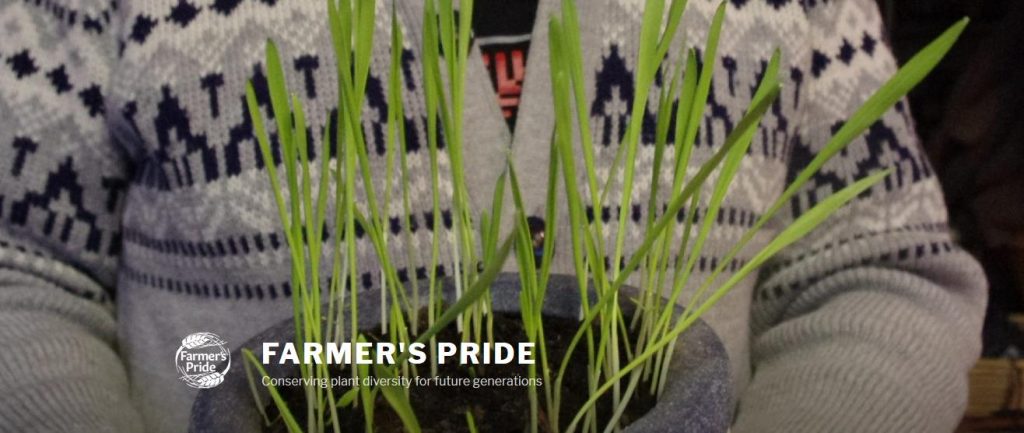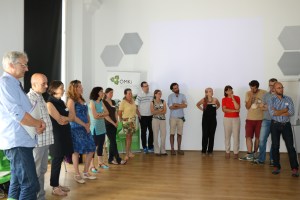Featured on BOND’s website: 2018.07.02.

by Lili Balogh
On June 21st various actors involved in agrobiodiversity from Hungary, Switzerland, Turkey and Austria came together in Budapest to discuss the next steps to take in order to conserve Europe’s plant diversity for food, nutrition and economic security throughout the region.
The meeting was organised in the frame of the Farmer’s Pride project, a three year European Union funded project which started in November 2017 that aims at networking, partnerships and tools to enhance in situ conservation of European plant genetic resources’. Hungary was chosen as a model for community seedbank networking, where national partners from the formal sector (national coordinator, genebanks, research institutions, etc.) will be involved to establish a national in situ network. The results will be used to demonstrate best practices—for example, to show how the conservation of populations of multiple species at various locations, and in different environmental conditions and stakeholder management contexts, can be efficiently managed.

Several international projects dealing with agricultural issues were presented, along with the BOND project by our partner organisation Védegylet.
Together the participants tried to see what are the challenges and opportunities that arise when building a network around ex situ and in situ plant diversity conservation. As an outcome the participants agreed on continuing to build this community and have regular meetings, where they update each other on the advancements of the projects they are involved in; and since the projects have a lot in common, like building networks, interacting with decision makers influencing policies, etc., future cooperations are also possible.
Get involved and help them in the collection of plant genetic resource stakeholders here.
Here is the list of the projects presented during the meeting:
- DYNAVERSITY analyses and describes the actors involved in plant genetic conservation for agriculture in order to suggest management and governance models and to construct new forms of networking. It facilitates exchange and integration of scientific as well as practical knowledge on how to best manage diversity in agriculture and in the entire food chain, restoring evolutionary and adaptation processes.
- LIVESEED is based on the concept that cultivars adapted to organic systems are key for realising the full potential of organic agriculture in Europe. The 4-year project will help to establish a level playing field in the organic seed market across Europe, improve the competitiveness of the organic seed and breeding sector, and encourage greater use of organic seeds by farmers. LIVESEED will improve guidelines for cultivar testing and strategies for ensuring seed health. It will develop innovative breeding approaches suited to organic farming. Finally, it will investigate socio-economic aspects relating to the use and production of organic seed and their interaction with relevant (EU) regulations.
- The project “TRansition paths to sUstainable legume based systems in Europe (TRUE)“ is a balanced practice-research partnership of 24 institutions, which aims to identify the best routes, or “transition paths” to increase sustainable legume cultivation and consumption across Europe. Sophisticated status quo analysis and advanced modelling approaches combined with data generated from 24 Case Studies and transdisciplinary knowledge-exchange will lead to concrete innovations and to a final Decision Support Tool for primary producers, agronomists, processors, associated businesses and decision makers to help determine a range of options for successful transitions that include a variety of legume species and processing approaches to match the pedo-climatic zones and farm network types. Legume Innovation Networks are being formed in three different pedoclimatic regions across Europe, which are: ‘Atlantic’, ‘Continental’ and ‘Mediterranean’.
- FIT4FOOD2030 supports the urgently needed transformation of research and innovation (R&I) on Food and Nutrition Security (FNS) in Europe. This transformation is needed to future-proof the European food systems: to make them more sustainable and resilient, and to find solutions for the many food-related challenges Europe is facing, including hunger, malnutrition, obesity, climate change, scarce resources, and waste. To achieve that, FIT4FOOD2030 will create a sustainable, multi-stakeholder platform, mobilising a wide variety of stakeholders at the level of cities, regions, countries, and Europe. Recognising the evolving nature of the FOOD 2030 policy framework, the project activities will be flexible, responsive, inclusive, efficient, innovative, value-adding and supportive to the FOOD 2030 policy framework of the European Commission Directorate General for Research & Innovation (DG RTD).

